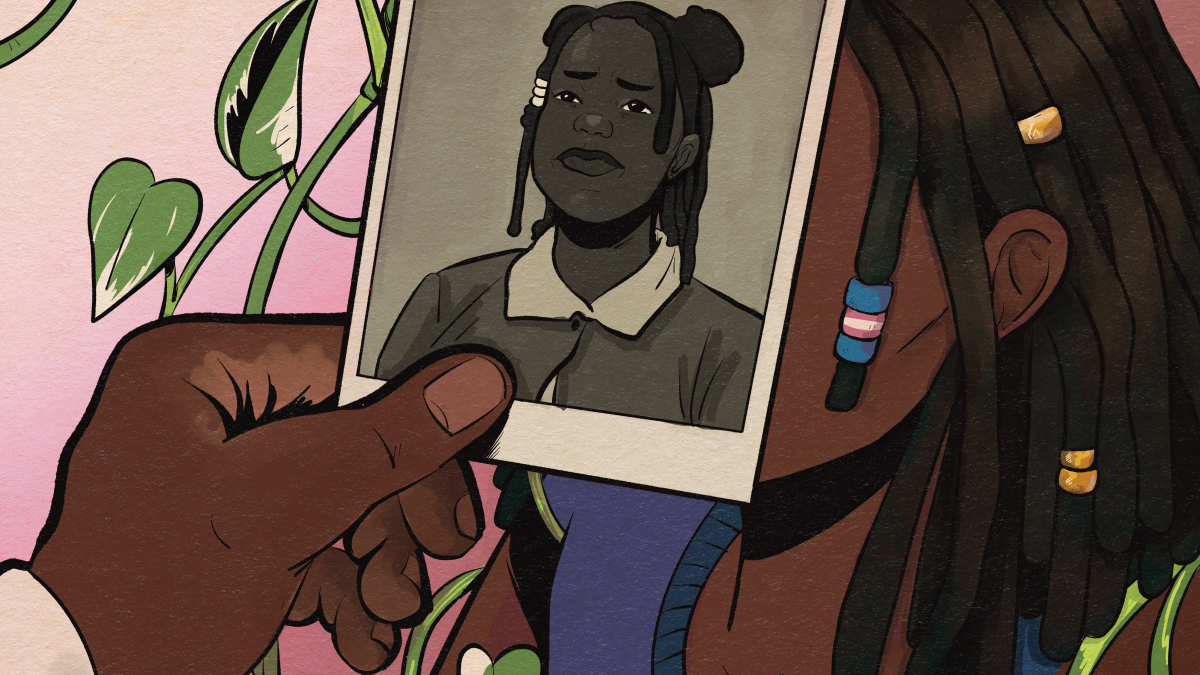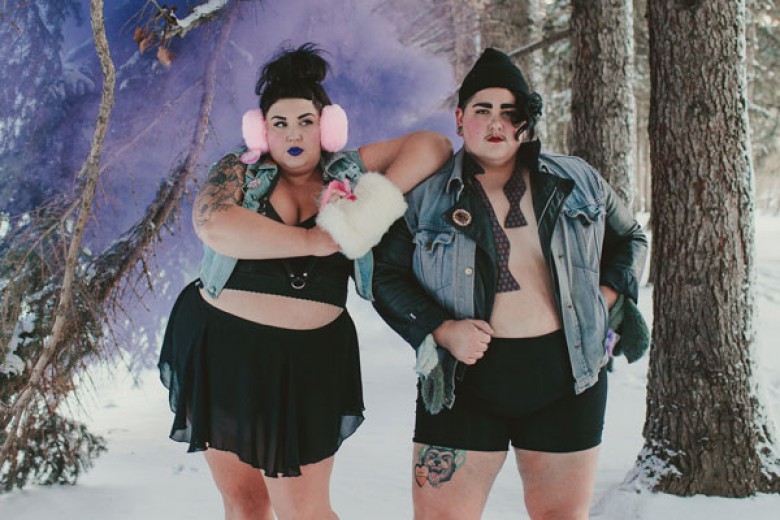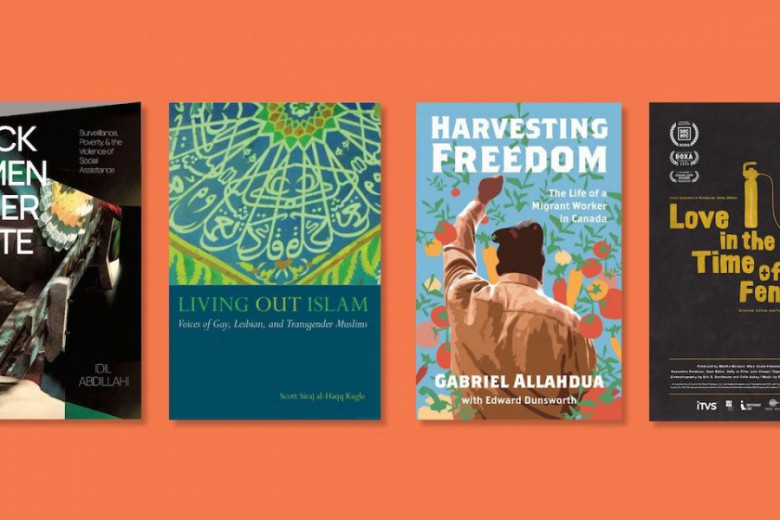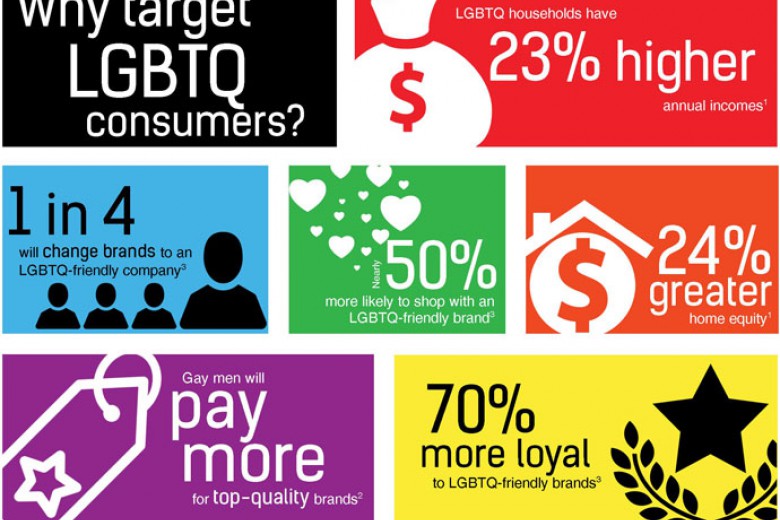Prologue
_ _ _ _____ ____ ___ ____ womb
An archaeological site _
genocide.
fallopian tubes,
you might find
ancestors
raped into____ ____.
Colonies erected
I imagine each ovary ___ a slave revolt
_____
Viability. Epidermis. Kidnapped
Probability. Dermis. Bred
Profitability. Hypodermis. Sold
bodies___ they ___ produce.
As pig
As cow
As broods to sow
__ decide who ___ worth,
was quality and who was quantity.
bellies of the enslaved
yoked.
Farming ___ supremacy
Birthing ___ resistance
Of chattel
conception
colonisation
gendered for capitalism.
Act One
To be Black and exceptional in this world requires seeing yourself not in your people but in whiteness. (p. 79 Hari Ziyad, Black Boy Out of Time: A Memoir)
I feared coming out as queer because I am Jamaican. I feared coming out as non-binary because I am Black. My body is a site of colonial enterprise. It is a site of enslavement, genocide, and sexual coercion. At 39, I carry a womb-woman that white medical science says is abnormally fertile and at elevated risk for a failed pregnancy – the failure being mothering is not guaranteed. The latter brings me relief, an unshackling realization.
The mother’s mark, not the father’s name, determined your fate. (p. 80 Saidiya Hartman, Lose Your Mother)
My race and gender cannot be extricated from my nationality; my relationship to all aspects of body autonomy is crafted through the lens of colonial Jamaican society and the narratives of surviving in the society. The confidence to access my gender expression claimed through forced choice. Yet neither would be accessible without the deep-rooted exploration of the question: Do I define my Blackness?
Act One (v.2)
Enslaved women and their children were essential to abolitionist goals of transforming the colonies from slave to free societies […] Abolitionist plans therefore firmly lodged the future of the sugar colonies within enslaved women’s bellies. Once their offspring were “raised up in the knowledge of their duty,” they would become “at last civilised” […] Enslaved women could be sources of freedom if their offspring could be groomed to adopt British cultural practices and social organization. (p. 42 Sasha Turner, Contested Bodies)
My parents have never asked me for grandchildren. Such hopes and dreams for my womb haven’t been expressed. In my family, my worth wasn’t tied to getting married and having children. As a person assigned woman at birth, the dangers of developing close intimate relationships with those assigned man at birth were made clear. These two bodies coming together at an early age would only lead to trouble. The inevitability of sexual desire leading to the seed sowing in my womb – the dreaded teen pregnancy. My options for a secondary school education were all-girls schools only.
- Boys could call my house before 8 p.m. only.
- Interactions with boys were in public and group settings only.
- Boys who attended traditional high schools (established before Independence 1962) only.
During my first year of high school, a group of us (boys included) planned a movies-and-mall hangout. I had been dropped off at the movies many times before this; however, boys from the co-ed elementary school were in attendance – thus my mother was in attendance. The messaging was never forceful; the expectation was clear, and I wasn’t particularly challenged by it. I shared the same degree of academic commitment that my parents did. I shared their hopes and dreams.
Based on his parents’ recollections, Willie McCullough of North Carolina described breeding: “Some of the slave women were looked upon by slave owners as a stock raiser looks upon his brood sows, that is from the standpoint of production.” (p. 82 Daina Ramey Berry, The Price for their Pound of Flesh)
I attended an all-girls high school, where students often discussed the proximity to boys. Proximity to whiteness translated to a higher degree of trust between “white” parent and child in my teenage mind. In short, the white girls, lighter-skinned girls enjoyed greater freedom of public access to relationships with boys in all grades. There were fewer girls closer to my dark-skinned Blackness allowed to publicly fraternize with boys and more often than not, they were the offspring of Black affluence. The Black girls who failed to keep their wombs unfertilized were shamed for it. Yet, the same wasn’t true for those with the lighter hues. They were protected, directed, and seemingly unconditionally supported. I would frequently attempt to rationalize this observation within a limited understanding of race, gender, and colonial politics. Weren’t white girls susceptible to the same derailment of their life’s pathway as Black girls? Were they somehow better prepared to respond to the sexual advances of boys? Was I a weaker girl? Was my Blackness an inherent marker of sexual deviance or lesser worth?
Believing that mixed-race children were even more sophisticated than Creoles [African-descended people born in the colonies], abolitionists advocated for their immediate freedom to the custody of churchwardens. Appointed custodians would act as guardians of colored children. (p. 41 Turner, Contested Bodies)
At the time, I didn’t give any thought to the possibility that one of my classmates or even friends could be a descendant of the family that captured, or enslaved, or raped my ancestors. The collective narrative enshrined in the Jamaican motto “Out of Many, One People” absolves the descendants of the colonial machinery of any relationship to that history. Yet, the pigmentocracy is evident in Jamaica and the wider Caribbean. Whether those at the top of the social ladder are the descendants of the enslaver or migrants from European and Arab countries, what remains is a social construct that has the dark-skinned Black persons at the bottom beholden to the pronatal reform that abolition was forged on.
The heteropatriarchy of the apprenticeship program for mixed-race boys and girls implicitly promoted biological reproduction among the more “advanced” segments of the unfree population, whose freedom ahead of the blacks (meaning no racial intermixing) positioned them as exemplars of appropriate gender order. (p. 41–42 Turner, Contested Bodies)
It is the pigmentocracy that I observed in high school – the modern expression of a slave society where those who could claim whiteness had greater access to agency, opportunity and self-determination. The guilt-ridden relationship that Black bodies hold with sexuality and reproduction isn’t coincidental or an expression of Black culture – it is the product of slavery enshrined within our cultural communities. They captured us for our bodies and freed us only after establishing a moral and legal framework for controlling our Black bodies.
Jamaican social customs dictated that girls with a greater mixing of “white blood” received preferential employment as domestic workers over the more degrading labor in the fields. (p. 233 Turner, Contested Bodies)
My worth was an entanglement of the darkness of my skin and the reproductive ability of my womb. Together, these two things represented my inferiority in the colonial racial hierarchy and how much access I would be given to the master’s freedom. It was the responsibility of my parents to instill gender expectations while simultaneously breaking the glass ceiling. Only then, after I have attained colonial value, do I dare consider making life in my womb. In the post-legal slavery world, a Black person’s access to their womb is a right earned, not one given. Moreover, there were hierarchies of quality placed on the womb of a Black person. The value of the unfertilized womb is determined by the worth placed on the womb carrier. As Black bodies were extricated from the plantation, divided into the labourer and the skilled, the intersection of race, gender, class, and intellect created new hierarchies of Black oppression.
When I was 16, I got in trouble for going out with a boy. When I was 18, I got in trouble for declaring I wasn’t attracted to boys. In my second year of university, my aunt asked if I didn’t intend on getting a boyfriend. My grandmother asked me sometime around my 22 birthday if I had plans to marry and start a family. In the middle of each of these memories, I rescript them. I replace the silences with the truth. I am different in these reimaginings of the self. In the retelling of these moments, my womb is lodged in my throat, a mere cough away from emancipation.
Act Two
The most depressing thing about being queer in this world is the fact that it isn’t just the possibility of your sexuality that you are taught to be afraid of: a world where you can hold the person you love without guilt terrifies you, too. (p. 99 Ziyad, Black Boy Out of Time: A Memoir)
The defining of my individual and collective Black identity has been affirmed in the accepting and naming of my non-binary identity. This declaration runs counter the teachings of the gender binary in Black spaces. There is an autonomy in gender expression and identity of which enslavement robbed ancestral Black bodies – the biopolitical justice of reclaiming ancestral knowledge.
Act Three
AT RISE. A reporter stands on the outside of an unsanctioned gathering of Black bodies.
Reporter (BOB): Yes, that’s right Jim. The streets are filled with … well, I don’t know what to tell you. They call themselves unicorns, non-binaries, precolonial. They are calling themselves the ones we erased. Jim, I’ve never seen anything like this.
The camera pulls the frame wide to reveal a small but animated crowd of bodies performing various states of existence – being and dancing – stillness and static.
“Womb
Womb
We are the womb army”
Jim: I’m sorry, Bob, what are they chanting?
Reporter: Let me listen in for a moment.
Bob lowers his microphone and performatively leans his head to the left, presumably to hear the chant more clearly.
Reporter: It sounds like the word womb.… Yes, yes … they are repeating the word womb. I’m not sure what to make of this.
Jim: Sorry, Bob, if I’m not mistaken. Are they all … Black?
Reporter: Black?
Jim: Yes, Black?
Reporter: I suppose that matters.
Jim: Does it? They look a bit ridiculous, don’t they. They look possessed. Is this the Obeah? Bob, you better get back to civilization.
A Black body walks into the frame.
Jim: Bob, behind you!
Bob runs away, dropping the microphone. Black Womb catches it before it falls to the floor.
Black womb: Hey Jim.
Jim: Yes … don’t get any ideas, the world is watching.
Black womb: Are they, Jim? Is the world really WATCHING or are people just tuned in? Look at me, Jim, you are really going to want to be zoomed in for this – you did this. You’re complicit.
Jim: I beg your pardon? How do you come by this accusation?
Black womb: How do you come by your innocence, Jim?
Jim: What do you mean? I didn’t kill anyone. I wasn’t there. I’m just a man reading the news.
Black womb: Person.
Jim: What?
Black womb: They was a Black womb-carrying person.
Jim: What’s the point of all this? You’ve hijacked the streets and you’ve hijacked the newscast wielding baseless accusations.
Black womb: You were there, Jim. You and your daddy and your mammy and his daddy and his mammy before him. You know who else was there? The wombs that nurtured the supremacy not by choice but by chattel. Tell me, Jim, how are your ratings?
What’s the commercial value of a dead Black person?
What’s the commercial value of a dead Black woman?
What’s the commercial value of a dead Black queer?
Tell me, Jim. When did we become worth more dead than alive?
Jim slams his hand on the desk, rising up from his chair, a visible gritting of his teeth.
Jim: Stop resisting! There is an order to things. The rest of us understand that. Your kind never listens and then you do this. Beasts looting and gallivanting in the streets inconveniencing the civilized. Don’t want to be treated like animals, don’t act like animals. Besides, the use of “womb” is medically inaccurate.
Black womb: It’s like I’ve been saying, Jim. You were there. You are always there. You’re always somewhere in the corner, lurking with a whip in one hand and rage in the other. You have made the walls so high, we climb on top of each other hoping to find a way over. But we’re returning, Jim, and that’s what scares you most, isn’t it? Returning to the people we were before, customs and ways of being – when we all matter. Before your patriarchy.
Before your ships.
Before your colonies.
Before your auctions.
Epilogue
I am a person with a womb
genderless:
___ disconnect between what society has assigned and me
to be
sits heavy on my uterus.
If my womb does not _____ ____ ____, am I Black enough?
If Black history books write about me, will I be aborted from the story?
If I told you that the hierarchy we have internalized does not serve us
If I told you the hierarchy of race and gender was never ours
If I told you I am Black enough
That Black women did not need Black men to protect them
That before the first
Exploration. Exploitation. extraction.
Black men _____,
Black women didn’t need to be strongest _______ in the room
And those who were neither
always belonged
The internalized machinations of colonization upon ___ bodies
What if I told you we have always been at the centre of the resistance
That queerness is not a liability
That this is the pathway to shedding whiteness from our pores
This thing we must reckon with
The racialized gendering to unlock our liberation
Go back and fetch it…
Free the Black Womb
To become this…
Free the Black Womb
If we are to resist…
Free the Black Womb
__ ____ come to know the histories from whence we came
__ ____ stand face to face with the ugliness of truth
We are feasting on our own
In service of this imperialist experiment
The hierarchies within Blackness have nothing to do with Blackness at all.
To attain our fulsome liberation
We must understand the ways in which enslavement lives within us.
Our sense of gender, identity, community
Consider:
We are now the ones setting the price
for our pound of flesh.







